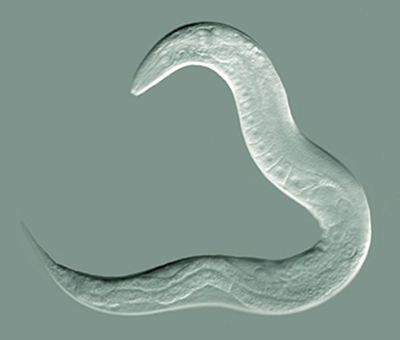Why do some people become alcoholics while others don’t? Finding the answer is like finding a needle in a haystack. I met with Dr. Jill Bettinger, associate professor in the Department of Pharmacology & Toxicology at Virginia Commonwealth University, to learn about how scientists are trying to fight alcohol use disorders targeting genetic polymorphisms that are common in alcoholics.
Maybe you know someone who can drink beer all day and not get drunk. Or, maybe you know someone who gets noticeably tipsy after drinking half a beer. People with something called “acute functional tolerance” are not particularly sensitive to alcohol when they are first exposed, and they tend to have a high tolerance for it.
“We know that in humans, ethanol sensitivity is strongly predictive of your propensity to become an alcoholic,” Dr. Bettinger said. People with acute functional tolerance and a high tolerance for alcohol (not drunk after a few drinks) are more likely to develop an alcohol use disorder in the future than people with a low tolerance (very drunk after a few drinks).
 Response to alcohol is partially dictated by genetics. Model organisms with easily editable genomes are tools for identifying specific genes involved in the response to alcohol. One such model organism, Caenorhabditis elegans, C. elegans (see ELLA-gans) to science enthusiasts, is a 1 millimeter long transparent nematode worm (pictured). They are one of the simplest animals in the world; their lack of complexity allows us to study the direct effects of genetic variation on response to alcohol.
Response to alcohol is partially dictated by genetics. Model organisms with easily editable genomes are tools for identifying specific genes involved in the response to alcohol. One such model organism, Caenorhabditis elegans, C. elegans (see ELLA-gans) to science enthusiasts, is a 1 millimeter long transparent nematode worm (pictured). They are one of the simplest animals in the world; their lack of complexity allows us to study the direct effects of genetic variation on response to alcohol.
When worms eat food soaked in alcohol, they get drunk. “Their crawling, which is normally an elegant sine wave, becomes uncoordinated,” Dr. Bettinger explained. It’s sort of like failing a sobriety test that a police officer might give you. I looked at Dr. Bettinger skeptically, trying to find a polite way to ask what worms crawling could possibly tell us about human alcoholics. How could a creature that only has 302 neurons be a valid model, when lab mice have millions of neurons, and humans have billions of neurons? Despite the neuron discrepancy, “Molecular conservation for nervous system function is extraordinarily strong,” Dr. Bettinger explained. “What we learn in worms has direct relevance to what’s going on in the human brain.”
Like humans, worms can show variation in their sensitivity to alcohol, and some worms don’t become as drunk as others. Therefore, worms that adjust rapidly to alcohol are exhibiting acute functional tolerance and are similar to the humans who are at high risk of becoming alcoholics. If we can figure out which genes are responsible for preventing individual worms from getting as drunk as the other worms, we can then design medicines that target those genes in human alcoholics.
 I asked Dr. Bettinger if she had found the gene that makes you an alcoholic - and if she had a lead for a new alcoholism-fighting medicine based on that gene. Genetics are only part of the puzzle, and many genes are involved in alcohol’s effects. But yes, her lab had identified a gene in worms associated with acute functional tolerance, which is also involved in the breakdown of certain types of fat molecules (fatty acid metabolism). Variation in the mouse version of this gene affects mouse fatty acid metabolism and response to alcohol as well.
I asked Dr. Bettinger if she had found the gene that makes you an alcoholic - and if she had a lead for a new alcoholism-fighting medicine based on that gene. Genetics are only part of the puzzle, and many genes are involved in alcohol’s effects. But yes, her lab had identified a gene in worms associated with acute functional tolerance, which is also involved in the breakdown of certain types of fat molecules (fatty acid metabolism). Variation in the mouse version of this gene affects mouse fatty acid metabolism and response to alcohol as well.
Here is the amazing part: “Particular fatty acids in the diet of rodents … could change certain measures of ethanol sensitivity,” Dr. Bettinger explained. Essentially, a diet high in eicosapentaenoic acid (EPA), an omega-3 polyunsaturated fatty acid found in fish oil, made mice who could previously hold their liquor into lightweights. EPA lowered their tolerance. The exact mechanisms by which EPA changes alcohol sensitivity remain to be uncovered, but possible explanations include altering the function of the cell membrane, acting as a signaling molecule, or regulating stress hormones.
It would be amazing if something as easy as taking fish oil supplements could make you more sensitive to the effects of alcohol and thus reduce the odds of becoming an alcoholic. It’s too early in the research to speculate now, though, but maybe in 10 years, we will have the answer.
It amazes me that we can use a microscopic animal found in compost to answer questions about the genetics and molecular biology of alcohol response. However, “alcoholism…has a lot more going on than the simple molecular effects of the drug. If it were simply the molecular effects of the drug, then we could stop it, but that is absolutely not the case. The [neuronal] wiring changes. There are all kinds of changes, some of which we understand, many of which we do not understand, that lead to the very complicated disease of addiction. [However,] C. ellegans can answer questions about basic molecular effects. And those things can inform our study of addiction,” Dr Bettinger says.
The next time you bite into an apple and find tiny worms, take a moment to seriously appreciate everything we can learn from them. Then you can spit them out.
If you would like to contribute to this blog, please contact Luisa Torres at luisa@intelispark.com.
All content provided on the NEU blog is for informational purposes only. The statements and opinions contained in the blog posts are solely those of the individual authors and contributors and not of the American Society for Pharmacology and Experimental Therapeutics (ASPET). ASPET makes no representations as to the accuracy or completeness of any information on this site or found by following any link on this site and will not be liable for any errors or omissions in this information nor for the availability of this information. ASPET will not be liable for any losses, injuries, or damages from the display or use of this information. ASPET also does not endorse any products or services mentioned in this blog.